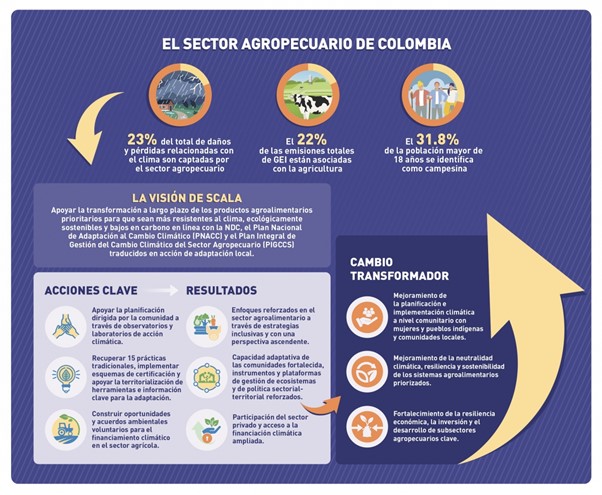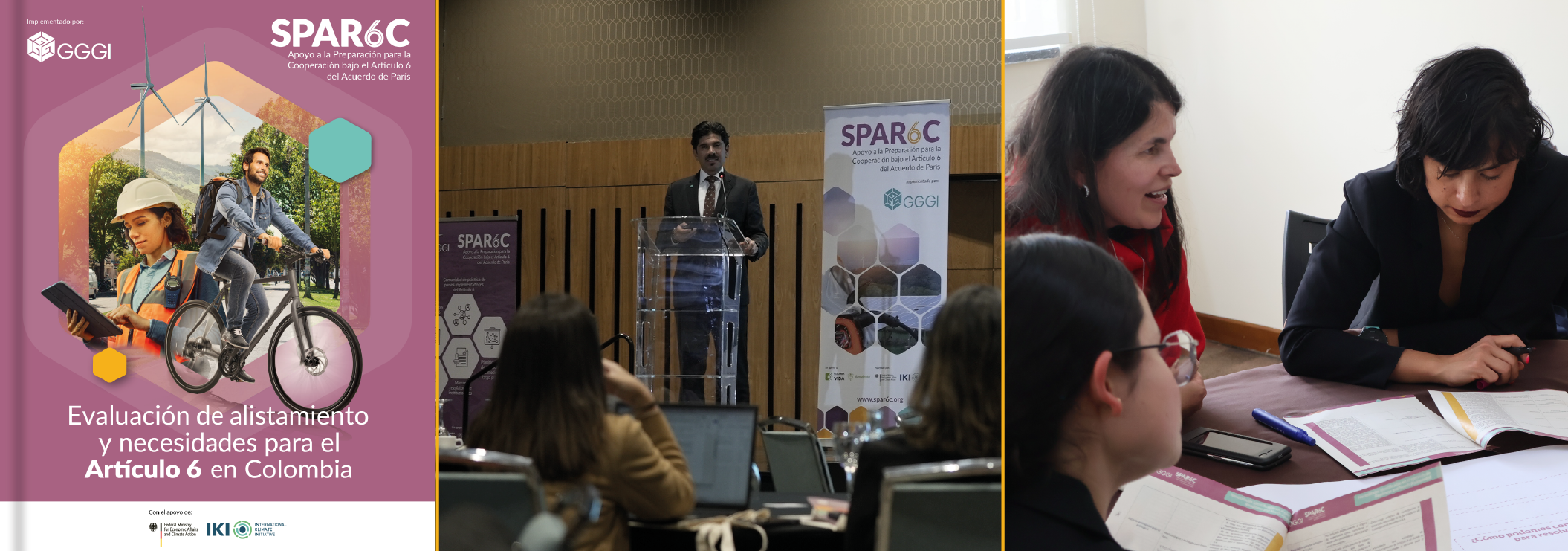El pasado 4 y 5 de septiembre, Barranquilla fue testigo…

About the SCALA programme
The Scaling up Climate Ambition on Land Use and Agriculture through Nationally Determined Contributions and National Adaptation Plans (SCALA) programme responds to the urgent need for transformative climate action in the agriculture and land use sectors. It addresses governance and financial barriers while strengthening the evidence base for implementing adaptation and mitigation actions. The programme aims to meet targets set out in countries' National Adaptation Plans (NAPs) and Nationally Determined Contributions (NDCs), and to contribute to the Sustainable Development Goals (SDGs).
The Food and Agriculture Organization of the United Nations (FAO) and the United Nations Development Programme (UNDP) are co-leading this 20-million-euro programme (2021-2025) through the International Climate Initiative (IKI) with funding from the German Federal Ministry for the Environment, Nature Conservation, Nuclear Safety and Consumer Protection (BMUV).
SCALA supports 12+ countries to scale up adaptive capacity and reduce greenhouse gas emissions to meet targets set out in National Adaptation Plans and nationally determined contributions, contributing to achieving the goals of the Paris Agreement.
SCALA supports partner countries; Argentina, Cambodia, Colombia, Costa Rica, Cote d’Ivoire, Egypt, Ethiopia, Mongolia, Nepal, Senegal, Thailand, and Uganda, to:
- Utilize systems-level assessments to improve understanding of climate options with transformative potential.
- Integrate land-use and agriculture priorities into planning, budgeting, and monitoring with whole-of-government approaches.
- Strengthen multi-stakeholder approaches, develop country-level synergies, and unlock public and private finance for sustainable development and digital innovation.
- Catalyze partnerships to achieve cross-sectoral, gender-responsive, and inclusive planning to benefit the most vulnerable natural resource-dependent communities, including youth and Indigenous Peoples.
SCALA in Colombia: country overview
Colombia is the third most populous country in Latin America and preserves close to 10 percent of the planet’s biodiversity. Climate change impacts are expected to pose significant and long-term effects on fragile and unique ecosystems, while accelerating land degradation, negative impact on water quality and agricultural production. As of 2019, 15.8 percent of the population is employed by the agriculture sectors, being especially threatened by climate induced weather events, such as La Niña, whose characteristics are strong periods of drought followed by intense rain. Agriculture in Colombia is indeed vulnerable to soil aridity, erosion, and desertification, all of which already pose serious threats to local livelihoods and food security and are worsened due to climate change.
Colombia submitted its first NDC in 2018, which outlined both mitigation and adaptation goals, as well as means of implementation. In December 2020, Colombia submitted a revised NDC revisada a revised NDC with more ambitious adaptation priorities to increase capacities on private sector and producers in 10 sub-sectors (rice, maize, potato, beef cattle, dairy, sugar cane, cocoa, banana, coffee and sugar cane). Energy and Agriculture, Forestry, and Other Land Use (AFOLU) are considered the most important sector for mitigation. In addition, Colombia adopted a NAP and a roadmap in February 2018, and on 25 November 2021 adopted its Integrated Climate Change Management Plan for the Agriculture and Livestock sector (Plan Integral de Gestión del Cambio Climático del Sector Agropecuario - PIGCCS).
SCALA in action
Colombia has encountered a few notable barriers while implementing its climate plans, such as a lack of local capabilities, limited access to climate information, and low involvement of the private sector.
Para superar estos retos y salvar la brecha entre las escalas nacional y local, el programa SCALA ofrece una serie de ayudas articuladas en torno al objetivo principal de acelerar la aplicación del PNA, la NDC y el PIGCCS. El programa SCALA también se basa en los logros alcanzados en el marco del programa NAP-Ag y el Paquete de Mejora de la Acción Climática (CAEP) de la Asociación NDC.
The programme focuses on the development of territorial capacities, tools, and information for the implementation of adaptation actions in different geographical areas and priority agricultural value chains such as coffee, rice, maize, meat, dairy, sugarcane, and cocoa, supporting the implementation and improvement of the Integrated Plan for Climate Change Management in the Agricultural sector (PIGCCS-Agriculture) elaborated on sectoral and territorial levels.
To this end, SCALA has contributed to the territorialization of 32 risk and vulnerability analyses at departmental level, así como a la puesta en marcha de dos observatorios territoriales, as well as to the implementation of two territorial observatories, in collaboration with the National University and the University of the Andes. These observatories conducted the characterization and participatory analysis of agrifood systems in two priority ecological areas - the Chingaza and Sumapaz moorlands.
SCALA also supported the design of a diploma in 'Food Sustainability for Climate Action', which offers scholarships and training to leaders of farmers' organizations. SCALA's work in the country has enabled the creation and implementation of four Community Climate Action Laboratories in the Moorland areas, with the participation of local associations such as Corcunpaz, Fortaleza de la Montaña and Asoproquinoa, which are scaling up and implementing adaptation and conservation models specific to each of their biodiverse production landscapes.
Through the adaptation dialogues methodology with Indigenous Peoples and local communities, SCALA is rescuing 15 traditional territorial agricultural practices and techniques (TTTs) that are resilient to climate change. This will enable the development of a guide to systematize these TTTs to strengthen locally based transformative adaptation pathways.

*The infographic is also available in Spanish| Disponible en Español..
At the sub-national level, SCALA supported the development of the integrated management of climate change in the state of Cundinamarca 2023-2050, which was approved and adopted in June 2023, in line with the Nationally Determined Contribution (NDC). At the national level, SCALA is also conducting a cost-benefit analysis for five prioritized value chains and developing a cost analysis and monitoring tool to support the implementation of the PIGCCS-Agriculture adaptation and mitigation measures..
Thanks to SCALA's support, the national Loss and Damage Assessment System for the agricultural sector has been consolidated, community-level tools have been developed and piloted, and workshops have been organized to promote local leadership and participatory dialogue to uncover the hidden relationship between gender and climate change.
Since its inception, SCALA has enhanced dialogue with the private sector on mitigation and adaptation in priority value chains. This includes developing guidelines and piloting a climate-adapted agriculture certification for small and medium scale farms, such as in coffee and potato, guiding their transformational adaptation and access to financial support. SCALA has supported the use of FAO's Adaptation, Biodiversity, and Carbon Mapping (ABC-Map) tool by sub-national governments and is mobilizing voluntary agreements in three value chains. Additionally, SCALA is developing guidelines for identifying financial instruments and incentives for climate action in agriculture, paving the way for new financing options in partnership with the private sector.
The Programme also supported the mobilization of USD 75,000 from the Climate & Clean Air Coalition (CCAC) to develop a national roadmap focusing on alternatives to reduce the open burning of prioritized crops.
© Foto from Felipe Rodriguez, FAO
Useful links
- FAO SCALA website
- UNDP SCALA website
- Colombia paves the way from adaptation planning to local implementation in five agricultural sub-sectors
- Sowing resilience: How Colombia's Indigenous Peoples adapt to climate change
- SCALA in Colombia-3 ways Colombia is transforming its agriculture sector
- Building climate-resilient farming systems in Colombia: territorial and community-based practices
- Building Climate Resilient Territories in Colombia
- Country Insights 2023: SCALA in Colombia




This Post Has 0 Comments